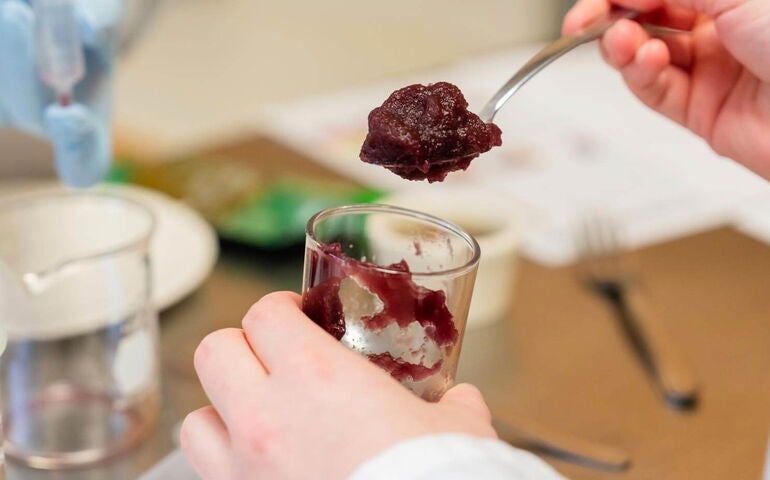
UMaine to develop $4.5M food production lab that would expand markets
 Photo / Courtesy University of Maine
Being able to bring value-added products to market creates more opportunities for farmers and food processors, according to UMaine.
Photo / Courtesy University of Maine
Being able to bring value-added products to market creates more opportunities for farmers and food processors, according to UMaine.
The University of Maine plans to develop a $4.46 million facility designed to support entrepreneurs in the food and beverage manufacturing industry.
The food innovation lab will provide commercial-scale processing and production capacity in 4,800 square feet of renovated space, at the Keyo Building on Rangeley Road on the Orono campus. There's a potential to build a 1,200-square-foot addition.
Earlier this week, the University of Maine System board of trustees authorized UMaine to spend the $4.46 million in state and federal funds to create the lab, which is in the design phase.
Construction is expected to start this fall for an opening by the end of 2025.
The lab will have three commercial food processing rooms, a walk-in cooler and freezer, processing equipment, blast-freezing equipment, kettles, a classroom and more.

“This facility will provide support to Maine’s food entrepreneurs through its proximity to research, education and expertise that is critical to grow Maine’s food businesses,” said Hannah Carter, dean of the University of Maine Cooperative Extension.
“The Keyo building’s location is ideal for this facility due to its location on campus and its square footage to accommodate production, education and office space.”
According to a 2023 report on Maine’s food sector, by the Maine Department of Economic and Community Development, Maine’s food sector plays an important role in the economy as a traded sector. In recent years, agriculture, seafood and food manufacturing have all seen strong employment growth and have high concentrations of employment in Maine.
And the food sector has several opportunities in Maine, including new technologies and new preferences for products like sea vegetables, sustainable proteins and plant-based foods.
However, the report cites faces several threats, including the effects of climate change, tight fisheries regulations, and food processing and supply chain infrastructure needs
From 2017 to 2022, the food and beverage manufacturing workforce, which makes up 1.2% of the state’s total employment, grew by 755 jobs, or 10%, from 7,536 to 8,291, according to the report.
“Maine’s farm sector is critically important to our economy, being able to bring value-added products to market creates more opportunities for farmers and food processors,” said Marge Kilkelly, owner of Dragonfly Cove Farm in Dresden and chair of the Maine Board of Agriculture, which provides guidance on University of Maine System agriculture education and research, led by UMaine.
The lab, she said, will provide “essential support for the food innovators to test their ideas and concepts while providing students with hands-on experience.”
Jason Bolton, associate dean of UMaine Extension, said the lab will allow startups and small- and mid-sized businesses to pilot production trials and to sell the products they make there. Entrepreneurs will be able to research and develop new goods, scale up production of their existing commodities, package items and distribute them.
The facility will feature a loading dock from which to ship products.
“The ability to commercially produce and sell food is exciting, and something that we've wanted to do for quite a while as an institution — to help food entrepreneurs and existing companies and also provide really fantastic training and educational opportunities to our learners,” Bolton said.
Bolton said the goal is also to connect students with businesses using the facility for potential internship opportunities.
“Hopefully in the first couple of years, we’ll be able to start co-packing, where we use the talent of students and the staff associated with the center to produce the food for companies that don’t have a workforce,” Bolton said.
UMaine Extension will hire a director and supervisory technician for the facility.
Bolton said businesses would be charged for using the facility at varying rates depending on their needs, with the goal of keeping it accessible to start-up food entrepreneurs. Facility use fees would be utilized to cover operational costs.
The project is supported by $2.5 million in congressionally directed spending secured in the federal fiscal year 2023 budget by U.S. Sens. Susan Collins, R-Maine, and Angus King, I-Maine, and by $1.96 million from the state’s Maine Jobs & Recovery Plan approved by the Maine Legislature.
The Orono campus is also home to the Dr. Matthew Highlands Food Pilot Plant, a research facility that houses a sensory lab, a state-licensed commercial kitchen and a wide array of food processing equipment. The Highland plant, in Hitchner Hall on Portage Road, has a mission to help food processors, entrepreneurs, farmers, researchers and students in the food industry and works closely with Cooperative Extension and the Food Science and Human Nutrition research cluster.
The Highlands plant will continue providing education, research and development support for Maine's food sector after the launch of the new Food Innovation Lab, a UMaine spokesperson told Mainebiz.
The new facility will build on the work of the current plant, particularly by offering more resources and by having the necessary licensing to allow entrepreneurs to sell what they produce in it.
Renovations at the antiquated Keyo Building in order to create the lab are consistent with the system’s goal of addressing its $1.6 billion in deferred maintenance, nearly $1 billion of which is at UMaine’s Orono campus, according to a news release.













0 Comments